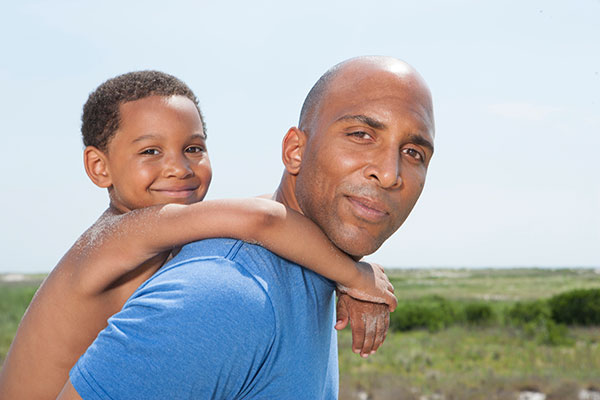There is no community that has been harder hit by dad-deprivation than the African-American community. If we are to expect dad-deprived boys to avoid destructive role models and the school-to-prison pipeline, we must reunite loving Black dads with their sons as well as create scholarships to inspire great Black male teachers, mentors, and coaches.
By Warren Farrell, Ph.D.

In “Marriage Among African Americans: What Does the Research Reveal? (Journal of African American Studies 13, 2009), Patricia Dixon, Ph.D., notes that although black males make up 6% of the population, they make up 50% of those who are incarcerated. She also states that the probability that a black male will be arrested and jailed at least once in his lifetime is extremely high in many areas around the United States; for example, in Washington, D.C., this probability is between 80 and 90%.
According to the NAACP’s “Criminal Justice Fact Sheet:
- More than one out of every six black men who should be between 25 and 54 years old today has disappeared from daily life. Incarceration and early deaths are the main drivers behind their absence.
- If Blacks and Hispanics were incarcerated at the same rates as whites, prison and jail populations would decline by almost 40%.
- Nationwide, African American children represent 32% of children who are arrested, 42% of children who are detained, and 52% of children whose cases are judicially waived to criminal court. African American children represent 14% of the population.
If disproportionately killing and imprisoning Black Americans is racist, then disproportionately killing and imprisoning males is sexist. But the real sexism is caring only about the systemic racism, and turning a blind eye to the other half of systemic racism: the sexism.
Black Dads and Sons: the Black Community is Hardest Hit by Dad-Deprivation
There is no community that has been harder hit by dad-deprivation than the African-American community. It wasn’t always this way. Between 1880 and 1960, a majority of African-American families consisted of married fathers and mothers. But in the early 60s, nuclear families dramatically decreased. Inner-city poverty and crime dramatically increased.
In 1965 sociologist Daniel Moynihan, who served under Presidents Nixon, Kennedy, and Johnson, led an investigation of inner-city life that concluded that the main predictor of growing up poor was not race per se but being born to parents who are not married. Why? A predictable outcome of no marriage was little or no father involvement.
Unmarried Black Dads: 72% of Black Children are Born Outside Marriage
While the Moynihan Report identified the quarter of Black children born outside marriage as a crisis in 1965, the government’s counterproductive solution – giving moms money for not being married to dads – has contributed to almost a tripling of unmarried births among Blacks (from 25 to 72%) and an expansion of the problem to white and Hispanic communities. The percentage of white children born outside marriage is now 36% – a nearly twelvefold increase from the 3.1% that it was in 1965.
Single moms have done an extraordinary job raising children even as they often raise money – and millions of their children have turned out well. But this rise of father absence often leaves single moms overwhelmed; dads depressed with neither purpose nor love; children more likely to be damaged in over 50 developmental areas; and pockets of fatherlessness that become pockets of crime.
Rediscovering the Value of Fathers on Father’s Day
As we’ve gone from the “Era of Father Knows Best” to “Father Knows Less,” Father’s Day is a perfect time to rediscover the value of dad. Fathers do not know less, they know differently. For example, Dad-style parenting is more likely to feature bonding by roughhousing, and stopping the roughhousing when rough gets too rough. And as dads engage the children in games, if his children don’t try hard enough or smart enough, he’ll teach them to be winners by letting them lose. The results are counterintuitive: Dad-enriched children demonstrate greater empathy, social skills, and postponed gratification.
Both Dad-deprived boys and girls suffer in fifty-plus areas of development, but a Dad-deprived boy is likely to suffer more intensely – by emotional withdrawal, depression, obesity, ADHD, imprisonment, and addiction to video games, porn, alcohol, drugs, and death by opioids.
Why this gap between Dad-deprived boys and girls? For starters, a Dad-deprived girl at least has a mom as a same-sex role model. Dad-deprivation creates in many boys a “Dad void” – a boy not knowing who he is as a man, frequently having less of the discipline he needs to fulfill his dreams.
The result? A multi-faceted boy crisis that resides primarily where dads do not reside. Today, boys are 66% more likely than girls to be living at home between ages 25 and 31. They are falling behind girls in almost every academic subject – especially in reading and writing, the biggest predictors of success. Forty-three percent more boys than girls are dropping out of high school, and even before COVID, more than 20% of these boys were unemployed in their early 20s – six times the national pre-COVID average.
Dad-Deprived Boys Hurt – So They Hurt Us

Involving a boy’s dad is not always possible. If we are to expect these boys to avoid destructive role models and the school-to-prison pipeline, we must create scholarships to inspire great Black male teachers, mentors, and coaches.
Black Lives Matter: We Must Encourage Black Dads to Raise Loving Sons
In every generation’s war, when boys feel needed and called upon to serve, many of them are willing to give their lives for America. If we are to be genuine in our caring about Black lives, we will be as outspoken at telling boys of every race that we will view them as heroes not only when they protect us by killing and being killed in wars away from home, but also when they become great fathers by loving and being loved in the peace they help to create at home.
Warren Farrell, Ph.D., has taught university-level courses in five disciplines: psychology, sociology, political science, women’s studies, and gender and parenting issues. He has been a pioneer in both the women’s movement (elected three times to the Board of N.O.W. in NYC) and the men’s movement. Chosen by the Financial Times of London as one of the world’s top 100 thought leaders, Dr. Farrell’s books include The Boy Crisis: Why Our Boys are Struggling and What We Can Do About It (BenBella Books, 2019), which he co-authored with Dr. John Gray. www.warrenfarrell.com
A version of this article originally appeared on Townhall.com.
Related Articles
How the Family Court System Fails Black Fathers – and How You Can Help
There is often a presumption that black fathers have little involvement with their children, which directly affects the outcome of many divorce & custody cases. Here’s how you can give black fathers a better chance in court.
Drawing the Line Between Corporal Punishment and Child Abuse
States around the country are drawing the line between permissible and excessive corporal punishment in different places. Regardless of where that line is drawn, in high-conflict custody cases, there is always a danger that one parent could accuse the other of child abuse to try to get a leg up in litigation.
New Study Finds Surprising Inconsistencies in Child Support Rates
When it comes to child support rates by state, a parent just six hours away can pay almost 3 times as much, despite their situation being otherwise equal.







